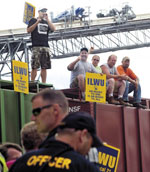
Showdown on West Coast Docks: The Battle of Longview
(November 2011).
click on photo for article
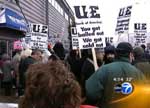
Chicago Plant Occupation Electrifies Labor
(December 2008).
click on photo for article
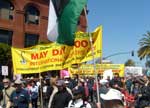
May Day Strike Against the War Shuts Down
U.S. West Coast Ports
(May 2008)
click on photo for article

March 2021
Vicious
Anti-Union Intimidation
at Yakima Fruit Packing Plant
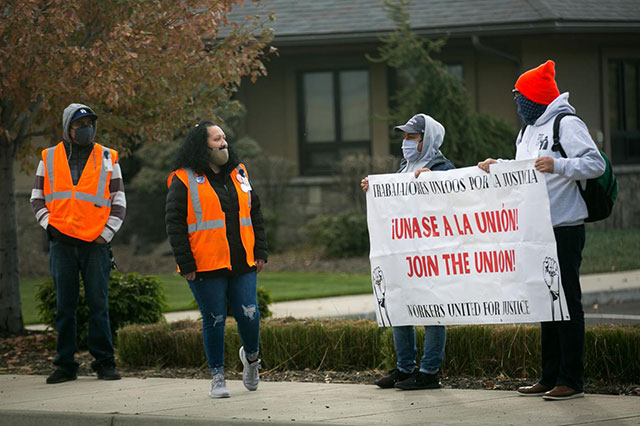
“Join the union!” Activists of Yakima packing house workers union, Trabajadores Unidos por la Justica (Workers United for Justice), campaigning for union recognition in October. (Photo: Armanda Ray / Yakima Herald-Republic)
MARCH 7 – On February 26, the National Labor Relations Board (NLRB) ordered a hearing on a complaint by Trabajadores Unidos por la Justicia (TUJ – Workers United for Justice) representing fruit packinghouse workers in the Yakima Valley, Washington. The NLRB found merit in the union’s charge that the employer, Allan Brothers, engaged in a long list of acts of coercion against the TUJ and its own employees. These practices were used against the Yakima strike last spring, when the mainly women workers courageously walked out at the height of the coronavirus pandemic demanding protective gear, cleaning of the plant and hazard pay. The same dirty tactics were used again successfully against the drive for union recognition in the fall.
The effort to organize a union grew out of the historic strike wave of fruit packing workers last year at a time when Yakima County had a higher rate of COVID-19 infection than anywhere else on the West Coast. (See “Victory to Yakima Packinghouse Strikers!” The Internationalist, 17 May 2020). It began in the early morning May 7, when workers walked out of Allan Bros. protesting dangerous conditions in the crowded plant that led to the spread of the disease among the workers. One of the strikers, David Cruz, would later die of the disease. The strike movement quickly spread to other packinghouses in the Valley. From Naches to Yakima to Selah, workers were fed up with poverty wages and management’s disregard for their health and safety in the midst of a deadly plague.
This movement inspired workers across the country and was something the Yakima Valley hadn’t seen in decades. But as the weeks on strike wore on, the balance of forces became clear. The strikers were isolated in one of the most right-wing counties in Washington. Production and shipping continued. Unions across the state offered words of solidarity but did not mobilize to form effective picket lines. The strikes gained the verbal “support” of politicians, priests, pastors and nonprofit staffers. But Facebook “likes” and press releases don’t win strikes. Company by company, the workers agreed to return to work in exchange for promises of no retaliation, attention to health and safety, and continued negotiations over wages. As the companies gained the upper hand, they went on the offensive, showing how little their promises are worth.
The AFL-CIO bureaucracy left the strikes to wither on the vine. Only at Allan Brothers was there a formal attempt to gain union recognition. Yet by the time the vote was held according to the schedule set by the NLRB, months after the last strikes had folded, the companies had the momentum and a captive audience for their union-busting pitch. The anti-union campaign was unrelenting and unconstrained by legal formalities. Workers were threatened that the union would check their immigration papers. They were offered Wal-Mart gift cards as bribes, managers “helped” fill out election ballots. Union supporters were silenced and kept off company property while full-time company “consultants” covered every shift, every day, subjecting workers one by one to whatever promises or threats might bend their will.
The vicious union-busting campaign helps explain the outcome of the NLRB-supervised representation election, whose results were announced on December 29, in which the TUJ lost badly, by a vote of 25 for the union and 234 against. The lopsided vote in itself was suspicious, as more than 100 workers actively joined in the May-June strike. The board found that Allan Brothers, by threatening to fire employees if they paid attention to strikers; denying off-duty workers access to non-work areas to distribute union materials; taking down license plate numbers and surveilling union supporters; threatening to and calling police to stop distribution of union literature, and prohibiting employees from talking about the union while in the plant, was “interfering with, restraining and coercing employees” in exercising their labor rights.
In addition, it found that other actions by the employer could be grounds for overturning the election, including harassing and threatening union activists; telling employees it was futile to form a union because the company would not negotiate in good faith with a union anyway; selectively enforcing a no-talking rule against union supporters; circulating an anti-union petition during worktime when the TUJ was denied any access; holding an anti-union raffle during the election period; bribing employees with $100 gift cards and filling out and mailing ballots with “no” votes were particularly outrageous. Elsewhere, known and suspected union activists at several plants have been fired and blacklisted, while the few holdouts face daily harassment from supervisors. So much for “democracy” and the “right to organize” in the workplace!
The fact is, companies use such blatant threats, reprisals and hardball tactics all the time to prevent unionization, even when they are supposedly illegal. They figure, so what if, months or years later, the NLRB might end up slapping the company for some of its more blatant offenses? It’s just a cost of doing business. Touch the vital interests of capital and the capitalists will remind you that this is their dictatorship, and they will defend it by any means necessary. Had the union won the vote, the legal obligation to bargain “in good faith” is no guarantee that the workers would have gained anything. Whether the workers or the bosses prevail in the class struggle is determined by power, and the root cause of the TUJ defeat in the vote is that the potential power of the working class was never put into action.
At the outset of the strike, we wrote (in “Victory to Yakima Packinghouse Strikers”): “Strikes must aim to shut the packing houses tight until the owners cede to the workers and their eminently modest demands. Key to that is organizing solidarity – not words, but action.... unions across the state must mobilize now to build mass picket lines to win the strike…” They did not. In the fall, the campaign for union recognition was largely left to local union activists. The pro-capitalist labor leaders’ eyes were fixed elsewhere: on winning gains for their masters in the Democratic Party at the November elections. Any struggle going beyond symbolic protest and moral witnessing would have risked embarrassing the Democrats who run the state.
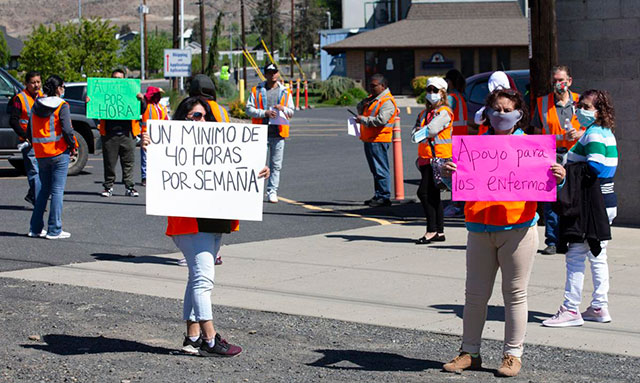
Workers on strike outside the Allan Brothers packinghouse in the Yakima Valley, Washington State, last May. (Photo: Evan Abell / Yakima Herald-Republic)
Despite the courage and determination of the strikers who led the strikes and went on to campaign for a union at Allan Bros., the AFL-CIO tops stood back and played by the rules while the bosses waged a take-no-prisoners counterattack in the months leading up to the election. As warned last May:
“Almost 25 years ago, the Teamsters and United Farm Workers with great fanfare launched a joint organizing drive in the valley’s farms and packing houses. The bosses were able to neutralize the campaign, knowing that the system of NLRB-regulated unionism could ensnare and wear down any union that stuck to its rules, especially in an industry with a seasonal workforce. Play by the bosses’ rules and you’re bound to lose.”
Now the NLRB hearing is set for May 4. Despite the defeatist, legalist policies of the official labor leadership, the fight is not over and there may now be another chance to mobilize to unionize the valley. But that requires a very different kind of trade-unionism, one based on hard class struggle rather than the class collaboration of the present labor officialdom.
In their loyalty to the capitalist state, the misleaders of labor guide every attempt at organizing the workers not by the laws and tempos of the class struggle, but by the regulations and calendar decreed by the NLRB. These standard procedures are designed to tame the working class, to tie up the unions in chains that prevent the workers from exercising their power. So long as the workers are not in a position to break these chains once and for all, the Board and its rulings cannot simply be ignored, and real openings for struggle must be made use of. But the fact that Democrat Joe Biden has replaced Republican Donald Trump will not change the fact that the NLRB is an agency of the bosses’ government, an instrument of the ruling class.
As we wrote at the end of the May strikes, “Yakima Strikes: The Battle Has Just Begun” (The Internationalist No. 60, May-July 2020): “A successful union-organizing drive extending to the Tri-Cities area to the east will require a leadership that goes beyond narrow ‘business unionism’ to defend all oppressed groups.” An all-out fight for unions in this rancher-dominated area would surely be met with attacks by the I.C.E. immigration cops (who use Yakima as a staging point for deportation flights) and by the fascistic and outright fascist thugs who infest the region. Thus workers’ power must be mobilized as well in struggles against raids and deportations, for full citizenship rights for all immigrants, and for defense of Latinos, African Americans and Native Americans against police repression and racist attacks.
To undertake genuine class-struggle unionism, forging a revolutionary leadership is key. What is essential now for the worker militants of Yakima is to draw the lessons from their battles over the last year, in order to go forward in the next round. Some will drop by the wayside, as often happens after setbacks. It’s those with the sticktoitiveness, class consciousness and determination to win who are decisive. James P. Cannon, the founder of the Trotskyist movement in the U.S., who came out of the I.W.W. syndicalists that were strong in the Pacific Northwest, summed up the perspective that guided the strikes that established the Teamsters as a powerful industrial union in 1934:
“Our people didn’t believe in anybody or anything but the policy of the class struggle and the ability of the workers to prevail by their mass strength and solidarity.... They knew that power, not diplomacy, would decide the issue.”
–“The Great Minneapolis Strikes,” in The History of American Trotskyism (1944)
“Our people” are to be found today among the heroic women workers of the Yakima valley. The task now is to win the most determined and dedicated militants to the struggle to build an internationalist workers party fighting for a workers government. ■